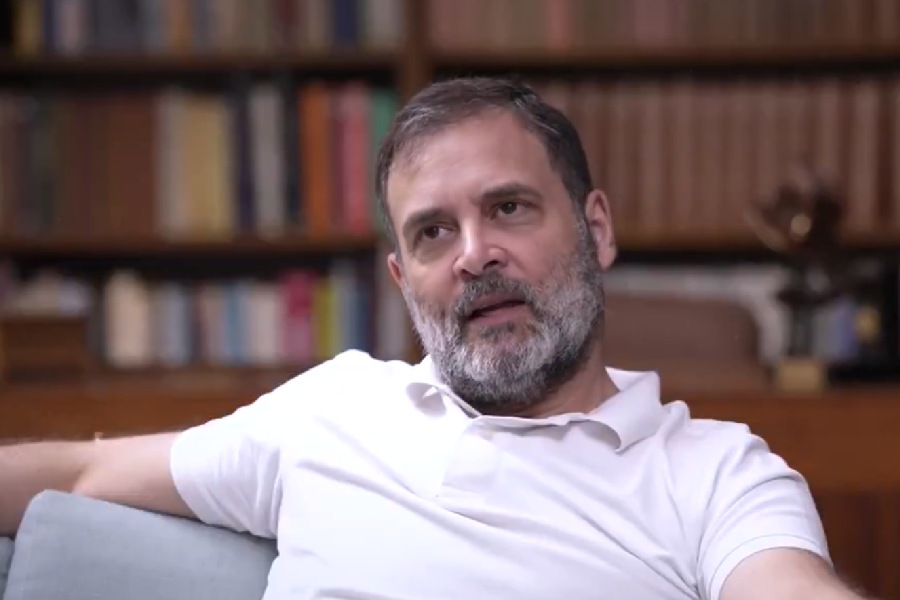The leader of Opposition in the Lok Sabha Rahul Gandhi has said Prime Minister Narendra Modi’s hugging US president Donald Trump will not help India deal with the economic crisis stemming from the US imposition of tariffs.
“India is not ready to face the truth now. You are going to have to develop the courage to face the truth. There is huge unemployment, your entire economic system has failed. You have a complete lack of harmony in the country,” Rahul said in a conversation with Delhi Congress leader Sandeep Dikshit. “The US tariff is going to have huge economic consequences. Modi’s hugging Trump is not going to resolve it. He bowed down his head and came back. Mahatma Gandhi, Jawahar Lal Nehru and Indira Gandhi would not have done that.”
The conversation shared by the Congress on its social media handle delved deep into the influence India’s first Prime Minister had on the leader of Opposition, the grandson of serving Prime Minister Indira Gandhi, while growing up in Lutyen’s Delhi.
Replying to a question, Rahul repeated what he had once stated on the floor of the Lok Sabha after becoming the leader of Opposition post-2024 Lok Sabha polls.
“There are two religious philosophies in India. Shaiva philosophy is completely democratic. Guru Nanak, Kabir are completely democratic. They do not believe in a hierarchy, a caste system. Mahatma Gandhi, Ambedkar represented that strain. Nehru represented that strain.”
Stretching the point further, Rahul said under the RSS it was not just institutions that faced a crisis.
“The ideas in our Constitution are 3,000 years old. What is under attack is not just a book. Rather, a set of philosophies that are inconvenient to the RSS,” Rahul said.
He claimed the assassination of Mahatma Gandhi happened because he was defending the Indian philosophical tradition.
Rahul said he was unafraid of taking the hit for speaking the truth. “Nowadays people don’t want to hear the truth. But somebody has to tell it,” he said. “I will take the hit. I am happy to take the hit. But I am not going to veer off from the truth because you want me to.”
Drawing comparisons between the situation now from the one 90 years ago when India was under the British yoke, Rahul said the times were much harder then, though there are similarities.
“There was a partnership between the British and the Maharajas and their bureaucracies and armies. The Indian people were completely squeezed in some ways similar as to what's going on today with Adani, Ambani and stuff. But we were much more courageous at that time than we are today. Today what is missing is certainly at the leadership level and also overall people are scared,” Rahul said.
The leader of Opposition, who has often been derided by the BJP as well as a section of his own partymen for being a “part-time” politician, said he was keeping with the family tradition.
“There was no political Nehru. There was no political Indira Gandhi. They did no view themselves as politicians. This idea that is very deep in my family is that politics is actually about truth,” said Rahul calling himself a truth-seeker and not a politician.
He also added that like his illustrious ancestors he was not bothered by how people perceived him.
“I am not incentivised by what you will think of me 20 years from today or 30 years from today. So that other strain, right, that you are searching for your truth, which is why Mahatma Gandhi became such a big part of my great-grandfather's life,” Rahul said. “Because it was a collective journey with Mahatma Gandhi as sort of in the Indian tradition as the Guru, as the guide.”
In the last one decade and more the BJP-RSS combine have triggered discussions on Nehru’s overriding other Congress stalwarts from the Indian freedom struggle like Vallabhbhai Patel and Subhas Chandra Bose.
“Patel and Nehru, they were friends and they were great friends, but they had disagreements on direction and that's perfectly fine. I mean even Mahatma Gandhi and Nehru had some differences on direction. But these two strains, I clearly see and I see them in myself also. They are damaging, also politically in today's context.
Rahul who was born years after the death of India’s first prime minister said he did not have a clear memory of when he had first heard of his great-grandfather, though his grandmother often narrated stories.
“My grandmother would refer to him as Papa and would talk about him. He really liked the mountains. We were in Kashmir once and she said, oh you know he almost died, he fell into a glacier (much before he became Prime Minister). That story I remember,” Rahul recalled.











